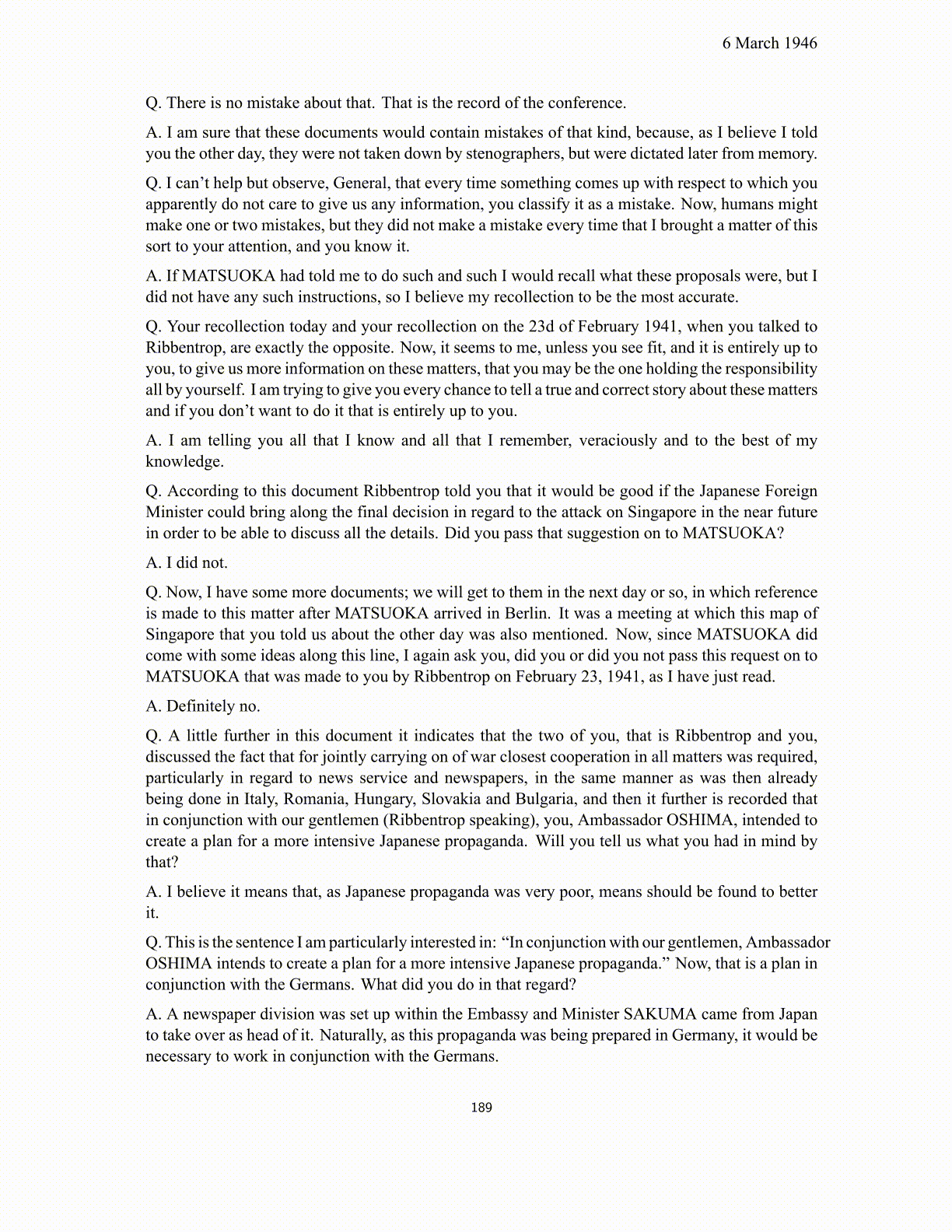
6 March 1946 Q. There is no mistake about that. That is the record of the conference. A. I am sure that these documents would contain mistakes of that kind, because, as I believe I told you the other day, they were not taken down by stenographers, but were dictated later from memory. Q. I can’t help but observe, General, that every time something comes up with respect to which you apparently do not care to give us any information, you classify it as a mistake. Now, humans might make one or two mistakes, but they did not make a mistake every time that I brought a matter of this sort to your attention, and you know it. A. If MATSUOKA had told me to do such and such I would recall what these proposals were, but I did not have any such instructions, so I believe my recollection to be the most accurate. Q. Your recollection today and your recollection on the 23d of February 1941, when you talked to Ribbentrop, are exactly the opposite. Now, it seems to me, unless you see fit, and it is entirely up to you, to give us more information on these matters, that you may be the one holding the responsibility all by yourself. I am trying to give you every chance to tell a true and correct story about these matters and if you don’t want to do it that is entirely up to you. A. I am telling you all that I know and all that I remember, veraciously and to the best of my knowledge. Q. According to this document Ribbentrop told you that it would be good if the Japanese Foreign Minister could bring along the final decision in regard to the attack on Singapore in the near future in order to be able to discuss all the details. Did you pass that suggestion on to MATSUOKA? A. I did not. Q. Now, I have some more documents; we will get to them in the next day or so, in which reference is made to this matter after MATSUOKA arrived in Berlin. It was a meeting at which this map of Singapore that you told us about the other day was also mentioned. Now, since MATSUOKA did come with some ideas along this line, I again ask you, did you or did you not pass this request on to MATSUOKA that was made to you by Ribbentrop on February 23, 1941, as I have just read. A. Definitely no. Q. A little further in this document it indicates that the two of you, that is Ribbentrop and you, discussed the fact that for jointly carrying on of war closest cooperation in all matters was required, particularly in regard to news service and newspapers, in the same manner as was then already being done in Italy, Romania, Hungary, Slovakia and Bulgaria, and then it further is recorded that in conjunction with our gentlemen (Ribbentrop speaking), you, Ambassador OSHIMA, intended to create a plan for a more intensive Japanese propaganda. Will you tell us what you had in mind by that? A. I believe it means that, as Japanese propaganda was very poor, means should be found to better it. Q. This is the sentence I am particularly interested in: “In conjunction with our gentlemen, Ambassador OSHIMA intends to create a plan for a more intensive Japanese propaganda.” Now, that is a plan in conjunction with the Germans. What did you do in that regard? A. A newspaper division was set up within the Embassy and Minister SAKUMA came from Japan to take over as head of it. Naturally, as this propaganda was being prepared in Germany, it would be necessary to work in conjunction with the Germans. 189